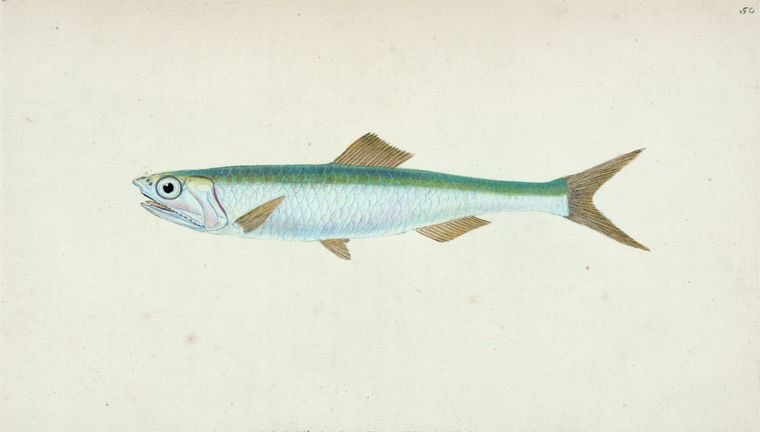Discrediting

Edward Donovan: Anchovy, Clupea encrasicolus (1804)
" … not a single deli in all of Denver could hold even a small candle [to the one I left behind.]"
Under the Absence Makes The Heart Grow Fonder Clause of the Exile's Charter, I set about hazing our new location shortly after we arrived. I've noticed that I do this by attempting to discredit the new place by demonstrating how different it is from the old familiar one. As with anywhere, living there accustoms one to certain readily available items. For instance, people living near the ocean grow accustomed to eating only the freshest fish. Move one of them inland, and you'll likely hear no end of complaining at first about how much better the fish were when they lived at the beach. There will be no slight hint of derision embedded within these complaints. Perhaps they're protecting or promoting their ego. The net effect of these grumbles reduces the validity of the newer place. I'm uncertain why this is so often the case.
I felt the lack of Italian delis almost as soon as we landed in Colorado. Though parts of Denver, like everyplace else, once featured an immigrant Italian community, much of that's dispersed over the decades. While we were in residence, the last red checkered tablecloth Italian place closed. It had become a parody of itself by then, with entrees better served as fond memories than present meals. Still, nostalgia encourages us to revere what's past more than present, and I grieve at what I can no longer receive. For me, then, I imprinted on when I could order up a couple of dozen salt-cured anchovies from the deli man at Littari's. He'd shuffle back into the walk-in, come out carrying a corroded old can of the beauties, and carve out a few filets for me, wrapping them in butcher paper before scribbling an indecipherable label. This exemplified a necessary form of old-world service that I found missing when we arrived in the Denver area.
I performed my searches and produced a list of potential replacements for my dearly departed Littari's. A few were okay, but none seemed like what I'd grown to feel was mine. I'd enter like a bar exam proctor, loaded with trick questions and rather too confident that this one would not pass muster. I'd start with an easy order. Did they carry my favorite pasta shape? This was an essential inventory item if this was to become my regular. If so, I'd go on to the following questions, leading up to my killer one, which would decide whether this place was worth my bother. "Do you have any salt-cured anchovies?" A few proprietors had apparently never heard of such a thing. How could any self-respecting Italian of whatever generation step behind a cash register without understanding the uses and lore surrounding salt-cured anchovies? I'd collect my other purchases and quietly leave, having succeeded in my primary purpose of visiting in the first place.
Within the first few weeks of arriving, I'd serially discredited every pretend Italian deli in the greater Denver metropolitan area. I then concluded that I'd have to learn to get along without what I'd grown to consider one of my fundamental rights, the right to have salt-cured anchovies on hand to add to anything I wanted. I wondered if I'd ever again experience a half-decent homemade tomato sauce or if I would never again produce a brase worth plating. This finding was a shining cherry on top of this latest phase of our Exile. I could subsequently settle into suffering gracefully, doing without. For what besides deprivation constitutes an adequate Exile? If not some deprivation, an Exile might be no more than a routine relocation. There must be some significant element lacking, or proper suffering becomes essentially impossible, and being Exiled is supposed to at least spark some unresolvable suffering.
A longing becomes the Exile's constant companion. Remembering home and family but being unable to access either becomes the very foundation of an Exile's existence. We live in eternal absence. It might be that I eventually came to aspire to be my own cruelest jailer as I sought to discredit the place we were living in as if that might thereby validate my being. An Exiled Descartes might have once said I'm denied, and therefore I am. In that very realest sense, though, it can't be an Exile if the principle discovers viable replacements for whatever they had to leave behind. Nostalgias and Exiles depend upon the past being both much better than the present and utterly inaccessible. Once any experience becomes permanently out of reach, it starts building one's character. 'I remember' gets elevated to sacrament status, and all's right with the world because some significant thing's irredeemably wrong with that world. This curious calculus animates an Exile. It gives him a deeper purpose and leaves him feeling worthy and suffering. This absence might be the Exile's most important possession. I shouldn't have been surprised when I enthusiastically engaged in this work. Ultimately, there was not a single deli in all of Denver that could hold even a small candle to Littari's. However, Littari's couldn't hold a candle, either, to some of the better providers I discovered while Discrediting Denver's delis.
We later learned we could order our precious salt-cured anchovies via mail order through Amazon, and our Exile moved a nudge closer to being done.
©2024 by David A. Schmaltz - all rights reserved


